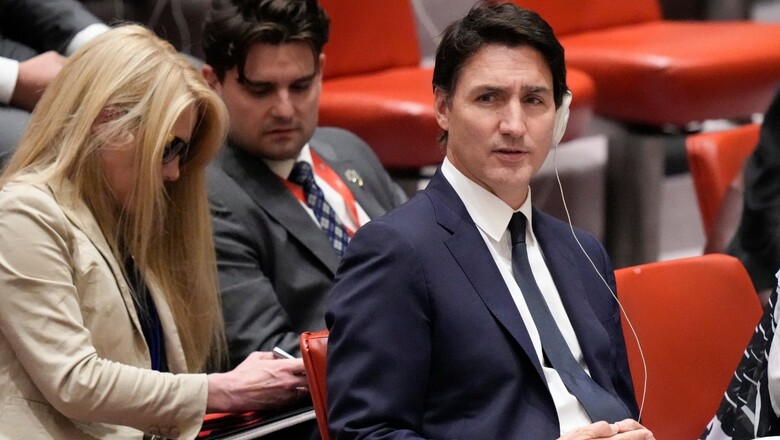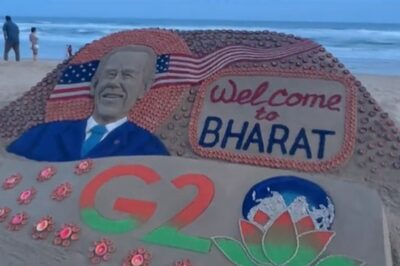
views
On 18 September 2023, Prime Minister Justin Trudeau of Canada publicly accused the Indian government of being involved in the killing of the designated Khalistani terrorist, Hardeep Singh Nijjar. He was the founder of Sikhs for Justice (SFJ), a Khalistani extremist group. Nijjar was killed outside a Sikh gurdwara located in British Columbia in June 2022.
Coincidentally, in a significant move, a judge in Vancouver had initiated a public inquiry into the allegations of foreign government’s involvement in Canada’s internal political matters. The inquiry was set up on 7 September 2023 following widespread allegations that China was interfering “in federal electoral processes and democratic institutions” of Canada.
A more detailed examination of these events on the same day points out how Prime Minister Trudeau might have been manipulated by Pakistan’s infamous Inter-Services Intelligence (ISI) agency. This manipulation resulted in the misrepresentation of the incident and the creation of a distraction from the China-related narrative within the public sphere. This diversionary tactic came at the cost of significant diplomatic turbulence for Canada, suggesting that Trudeau may have been unwittingly drawn into a complex geopolitical manoeuvre.
Trudeau’s public accusation against Indian government’s agents rightly invited strong diplomatic response from New Delhi which pointed out how Canada has turned into a haven for Khalistani terrorists and gangsters over the years. India has been raising the issue of the presence of Khalistani extremists in Canada with its authorities for several years. Trudeau’s tirade was unbecoming of a national leader to level such allegations of grave magnitude without presenting any concrete evidence to substantiate them.
The Canadian prime minister’s accusations are the outcome of a heady cocktail of his personal political calculations, Pakistan’s role and China’s machination. This narrative is closely intertwined with China’s global rise in the face of consistent censure from various international organisations for its gross human rights violations in Xinjiang and Tibet. Beijing’s policy of detention of over a million ethnic Uyghur men and boys in its Xinjiang region in the concentration camps, along with forced marriage of Uyghur Muslim women with Han Chinese has raised eyebrows and drawn condemnation. However, Beijing has often used its economic muscle as a carrot and stick to buy the silence of the international community over these rights violations. In the case of Canada, there have been reports that Justin Trudeau’s Liberal Party received generous funding from the Chinese Communist Party (CCP) over the years.
Michael Chong, a legislator from the Conservative Party and a vocal critic of China’s policies in Xinjiang within Canada, found himself targeted in May 2023 by a coordinated online campaign traced back to China, specifically on the platform “WeChat”. This campaign was a response to Chong’s anti-Beijing stance and his advocacy for the Uyghur cause. Notably, Chong had sponsored a motion in 2021 condemning China’s treatment of the Uyghur Muslim minority as a genocide.
Furthermore, allegations arose suggesting that “Chinese undercover agents or their proxies” were intimidating Chinese Canadians by making veiled threats against their relatives in China, should they raise concerns about Beijing’s policies, both within Canada and on the international stage. While this escalating situation prompted public scrutiny into foreign interference, finally ordered on 7 September 2023 and initiated on 18 September 2023, it seems to have rattled the Canadian prime minister as it could have exposed connections between Trudeau’s Liberal Party and the CCP as well.
In light of this context, Trudeau’s recent accusation against India for allegedly carrying out a targeted killing on Canadian soil appears to be a multi-layered nuanced move. It becomes evident that he may be hesitating to directly implicate China in the foreign interference inquiry due to concerns of potential diplomatic repercussions from Beijing.
As highlighted by Daniel Bordman from The National Telegraph, Vancouver has been grappling with the looming “spectre of foreign interference from China”, constituting a significant political scandal in the country’s recent history. He aptly summed it: “…in order to shift the spectrum from Chinese foreign interference, we have a story in Canada, which is essentially a story about Pakistani foreign interference, being framed as a story of Indian foreign interference to cover up the real story, which is Chinese interference.” This diversionary tactic, as Bordman emphasises, serves to obscure the actual story, which revolves around Chinese interference in Canadian affairs.
The diversionary tactics employed by Trudeau, at the expense of Canada’s diplomatic standing, appear to have been facilitated by his close associations with proscribed Khalistani terrorist front organizations, such as Nijjar’s Sikhs for Justice, among others. These connections extend to Islamabad, wherein the role of Pakistan’s intelligence agency, the ISI, cannot be underestimated, especially considering its 1980s policy of “K2”.
During the rule of General Zia-ul-Haq, the Pakistani Army had strategically linked Khalistan and Kashmir as part of its policy to weaken India. But this policy has now largely been dismantled due to India’s proactive measures on its home front. However, recent events suggest that this K2 policy may have been resurrected, primarily by the embattled military establishment of Pakistan, which has found safe havens in Western countries, with Canada being the most prominent among them.
In the ongoing standoff, Pakistan seems to have adeptly employed the bogey of Khalistan to establish a smokescreen, effectively providing cover to Justin Trudeau, the Canadian Prime Minister, on behalf of its Iron-brother and steadfast ally, China. This strategic manoeuvre suggests that the Canada-China-Pakistan nexus may have initially underestimated India’s response to the allegations, assuming that New Delhi would not react as assertively as it has. This smokescreen may have, in a way, shielded both Trudeau and China from immediate repercussions and scrutiny by diverting attention away but India’s swift response to the Canadian prime minister has effectively exposed him.
India’s active response has effectively rendered Trudeau a lonely figure within Canada and his credibility has hit rock bottom. This has allowed New Delhi to rightfully bring international attention to these safe terror havens deep inside western borders. Canada would do better to not allow its soil to be used for any subversive activities against foreign governments. The West should learn from recent history as terrorists nurtured in Western countries have turned against these countries inflicting heavy damage.
It is in the interest of the Western world to ensure that all terror activities in Canada must come to an end.
The writer, an author and columnist has written several books. He tweets @ArunAnandLive. Views expressed in the above piece are personal and solely that of the author. They do not necessarily reflect News18’s views.




















Comments
0 comment